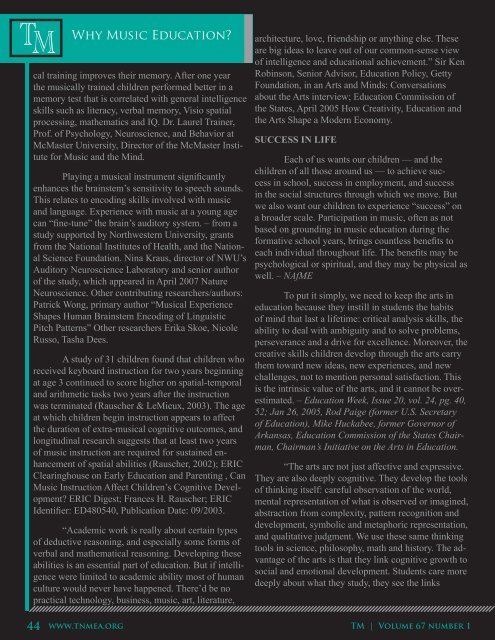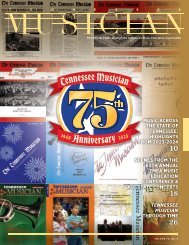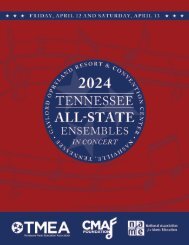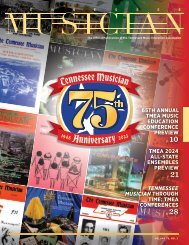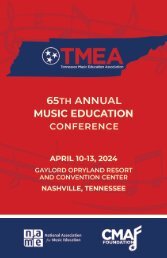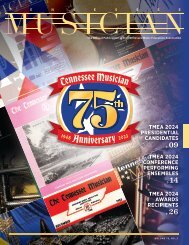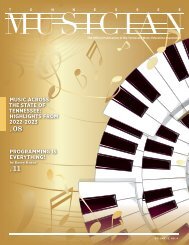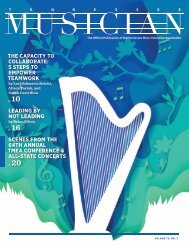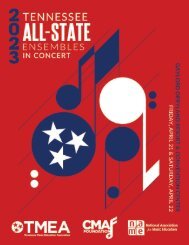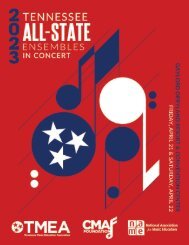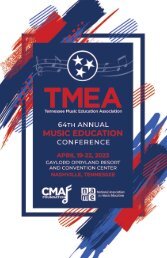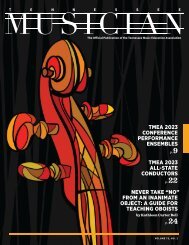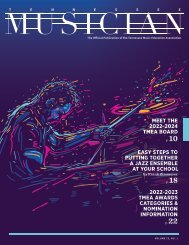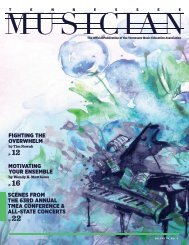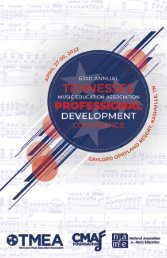Create successful ePaper yourself
Turn your PDF publications into a flip-book with our unique Google optimized e-Paper software.
TM<br />
Why Music Education?<br />
cal training improves their memory. After one year<br />
the musically trained children performed better in a<br />
memory test that is correlated with general intelligence<br />
skills such as literacy, verbal memory, Visio spatial<br />
processing, mathematics and IQ. Dr. Laurel Trainer,<br />
Prof. of Psychology, Neuroscience, and Behavior at<br />
McMaster University, Director of the McMaster Institute<br />
for Music and the Mind.<br />
Playing a musical instrument significantly<br />
enhances the brainstem’s sensitivity to speech sounds.<br />
This relates to encoding skills involved with music<br />
and language. Experience with music at a young age<br />
can “fine-tune” the brain’s auditory system. – from a<br />
study supported by <strong>No</strong>rthwestern University, grants<br />
from the National Institutes of Health, and the National<br />
Science Foundation. Nina Kraus, director of NWU’s<br />
Auditory Neuroscience Laboratory and senior author<br />
of the study, which appeared in April 2007 Nature<br />
Neuroscience. Other contributing researchers/authors:<br />
Patrick Wong, primary author “Musical Experience<br />
Shapes Human Brainstem Encoding of Linguistic<br />
Pitch Patterns” Other researchers Erika Skoe, Nicole<br />
Russo, Tasha Dees.<br />
A study of 31 children found that children who<br />
received keyboard instruction for two years beginning<br />
at age 3 continued to score higher on spatial-temporal<br />
and arithmetic tasks two years after the instruction<br />
was terminated (Rauscher & LeMieux, 2003). The age<br />
at which children begin instruction appears to affect<br />
the duration of extra-musical cognitive outcomes, and<br />
longitudinal research suggests that at least two years<br />
of music instruction are required for sustained enhancement<br />
of spatial abilities (Rauscher, 2002); ERIC<br />
Clearinghouse on Early Education and Parenting , Can<br />
Music Instruction Affect Children’s Cognitive Development?<br />
ERIC Digest; Frances H. Rauscher; ERIC<br />
Identifier: ED480540, Publication Date: 09/2003.<br />
“Academic work is really about certain types<br />
of deductive reasoning, and especially some forms of<br />
verbal and mathematical reasoning. Developing these<br />
abilities is an essential part of education. But if intelligence<br />
were limited to academic ability most of human<br />
culture would never have happened. There’d be no<br />
practical technology, business, music, art, literature,<br />
architecture, love, friendship or anything else. These<br />
are big ideas to leave out of our common-sense view<br />
of intelligence and educational achievement.” Sir Ken<br />
Robinson, Senior Advisor, Education Policy, Getty<br />
Foundation, in an Arts and Minds: Conversations<br />
about the Arts interview; Education Commission of<br />
the States, April 2005 How Creativity, Education and<br />
the Arts Shape a Modern Economy.<br />
SUCCESS IN LIFE<br />
Each of us wants our children — and the<br />
children of all those around us — to achieve success<br />
in school, success in employment, and success<br />
in the social structures through which we move. But<br />
we also want our children to experience “success” on<br />
a broader scale. Participation in music, often as not<br />
based on grounding in music education during the<br />
formative school years, brings countless benefits to<br />
each individual throughout life. The benefits may be<br />
psychological or spiritual, and they may be physical as<br />
well. – NAfME<br />
To put it simply, we need to keep the arts in<br />
education because they instill in students the habits<br />
of mind that last a lifetime: critical analysis skills, the<br />
ability to deal with ambiguity and to solve problems,<br />
perseverance and a drive for excellence. Moreover, the<br />
creative skills children develop through the arts carry<br />
them toward new ideas, new experiences, and new<br />
challenges, not to mention personal satisfaction. This<br />
is the intrinsic value of the arts, and it cannot be overestimated.<br />
– Education Week, Issue 20, vol. 24, pg. 40,<br />
52; Jan 26, 2005, Rod Paige (former U.S. Secretary<br />
of Education), Mike Huckabee, former Governor of<br />
Arkansas, Education Commission of the States Chairman,<br />
Chairman’s Initiative on the Arts in Education.<br />
“The arts are not just affective and expressive.<br />
They are also deeply cognitive. They develop the tools<br />
of thinking itself: careful observation of the world,<br />
mental representation of what is observed or imagined,<br />
abstraction from complexity, pattern recognition and<br />
development, symbolic and metaphoric representation,<br />
and qualitative judgment. We use these same thinking<br />
tools in science, philosophy, math and history. The advantage<br />
of the arts is that they link cognitive growth to<br />
social and emotional development. Students care more<br />
deeply about what they study, they see the links<br />
44 www.tnmea.org<br />
TM | <strong>Vol</strong>ume <strong>67</strong> number 1


